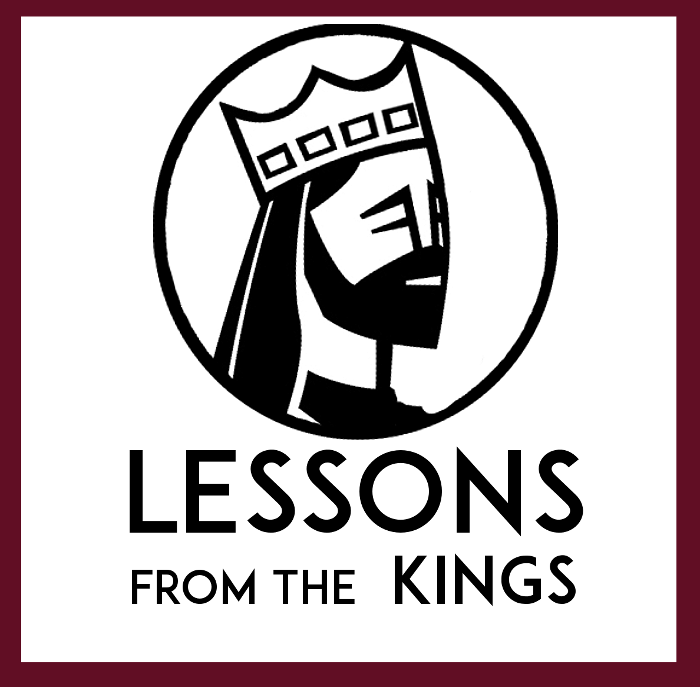Our Adult Discipleship group (a midweek Bible class) is going through the Kings of Israel and Judah. You are welcome to join us for any session in person or online. See the calendar for dates. [View Series]
This chart is a map of our course of study. We will go chronologically king by king. [View Series & Resources]
King Joash of Israel ![]()
Joash king of Israel is the grandson of Jehu. He is also called Jehoash, and he overlaps for a few years with the reign with the king of Judah who is called by the same names.
He perpetuated the “sins of Jeroboam son of Nebat,” namely, worship of the golden calf at Dan and Bethel, as well as the use of other high places. Jeroboam set these up 125 years earlier.
Joash grieved the loss of Elisha, yet when asked to follow Elisha’s directions followed them only half-halfheartedly. With God’s blessing and grace he was able to recover some Israelite territory lost to Aram. God also used him to humble King Amaziah of Judah.
Read about Joash King of Israel: 2 Kings 13:9 – 14:16; 2 Chronicles 25:17-25
Halfhearted Response to God’s Word
How would you rate your level of enthusiasm from day to day in your job? How would you rate your spiritual level of enthusiasm when it comes to following God’s direction and trusting his promises? How is your enthusiasm for trusting the Lord and following his commands different from what keeps you zealous at your job?
Read 2 Kings 13:14-19. Elisha had asked others to do some unusual things: “Go wash seven times in the Jordan.” (2 Kings 5) “Lay my staff on the boy’s face.” (2 Kings 4) “Go around and ask all your neighbors for empty jars.” (2 Kings 4). Now after over fifty years of serving as prophet he concludes with the odd request to “Get a bow and some arrows… strike the ground.” (2 Kings 13). Each time the action was connected with an intended outcome –by God’s blessing. It wasn’t necessarily the action itself but faith in the Lord that really mattered. Faith responds with action. Faith trusts his promises and acts relying on them. But sometimes it seems as if we don’t care to have or be part of the Lord’s promises. Our response to his Word is sometimes less than zealous and excited.
How did King Jehoash respond when he learned that his shooting of arrows was connected to the Lord’s promises to defeat the Arameans? What reasons might he have not been too excited about what Elisha had prophesied?
What promises and blessings does God give us in his Word? Why are our responses toward God’s promises sometimes halfhearted?
King Amaziah
Amaziah’s father, Joash, was murdered when he turned wicked. Joash was one of the few kings who had a great start but finished terribly later in life. His son Amaziah is just the same.
He sets out with faithfulness and listens to the Lord. But when he meets with success he turns toward idolatry and arrogance. His life is a strong warning against the believer who gets puffed up and takes for granted God’s blessings of grace.
His own people were so upset by the losses suffered on Jerusalem that they hounded him down to kill him.
Read of Amaziah: 2 Kings 14:1-21; 2 Chronicles 25
“The Lord Can Give You Much More”
Amaziah’s father trusted in riches for security when he tried to buy peace (2 Kings 12:17-18). Amaziah son of Joash does not commit this same mistake. Read 2 Chronicles 25:1-10
What did Amaziah need to forfeit and give up? Why did God ask him to do this? What empowered him to make this difficult decision?
In what situations does God desire we take the harder route in order to avoid working together with someone who teaches falsely?
List at least three reasons why a Christian and their congregation would want to choose the harder route rather than join together with those who teach false doctrine.
What comfort does 2 Corinthians 9:8 give you when you feel that you need more to get the job done and serve him in your life?
Don’t Take More than You Should
Read 2 Chronicles 25:10-24 When Amaziah let loose the men of Israel (see previous lesson 2 Chronicles 25:1-10) his faithful action of obedience to God became a cross to bear. How can our faithful following of Scriptural fellowship practices sometimes cause us harm or difficulty? How does being more aware of the dangers of joining together with anyone teaching falsely help prevent some of those issues?
Why was Amaziah feeling he could pick a fight with Israel? Identify some key factors toward his growing arrogance. How many warnings did Amaziah get to stand down? What was the result of his pride?
What things could cause a Christian today to become sinfully proud and arrogant? How can that pride stem from an improper response to a blessing from God?
What is the best cure for sinful pride? (Jeremiah 9:24; Isaiah 66:1-2; 1 Corinthians 1:26-31)

